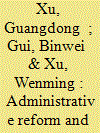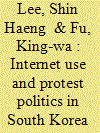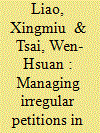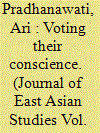|
|
|
Sort Order |
|
|
|
Items / Page
|
|
|
|
|
|
|
| Srl | Item |
| 1 |
ID:
165225


|
|
|
|
|
| Summary/Abstract |
China's economic miracle has been achieved at considerable environmental cost. To fight against environmental pollution more effectively, the Chinese government established the Ministry of Environmental Protection (MEP) in 2008. This study investigates the stock market reaction to this event and finds that, on average, listed firms in polluting industries experienced a statistically and economically significant negative abnormal return on the event date, which implies that the compliance costs of these polluting firms are expected to increase. In addition, this study finds that enterprises with different ownership styles and different political influence experienced different price reactions during the event window. More specifically, state-owned enterprises (SOEs) in general experienced a less negative abnormal return over different event windows, and provincial SOEs perform much better than central SOEs and sub-provincial SOEs.
|
|
|
|
|
|
|
|
|
|
|
|
|
|
|
|
| 2 |
ID:
165226


|
|
|
| 3 |
ID:
165227


|
|
|
|
|
| Summary/Abstract |
Interest groups and other organizations are crucial vehicles for voter mobilization, but variations in their capacities are not well understood. To clarify the ways in which vote mobilization capacities vary, I analyze vote mobilization in two private-sector industrial unions supporting the Democratic Party of Japan (DPJ). The Japanese Federation of Textile, Chemical, Food, Commercial Service and General Workers’ Union (UA Zensen), has a very large membership but mobilizes few votes. The Confederation of Japan Automobile Worker's Unions (JAW), on the other hand, has fewer members but mobilizes more votes. In this article, I argue that unions whose constituent units operate company towns are most successful in mobilizing votes. Organizational capacity –independent of membership size – matters in the electoral arena. Using data from House of Councillors elections, I show that those industrial unions that include many enterprises with company towns have advantage in voter mobilization.
|
|
|
|
|
|
|
|
|
|
|
|
|
|
|
|
| 4 |
ID:
165228


|
|
|
|
|
| Summary/Abstract |
This study examines the association between Internet use and protest politics in South Korea and Taiwan, using secondary data from the sixth wave (2010–14) of the World Values Survey. The data show that Internet use is positively associated with low-cost protest acts, like signing a petition. Internet use is also correlated with the willingness to consider higher-cost actions such as attending demonstrations and joining in boycotts. But it does not appear to consistently increase actual protests of this sort. Discussion is made to address comparable opportunity structures for protest politics in the two East Asian democracies, where the Internet is deeply integrated into the country's political landscape.
|
|
|
|
|
|
|
|
|
|
|
|
|
|
|
|
| 5 |
ID:
165223


|
|
|
|
|
| Summary/Abstract |
This paper uses Province A and City T as case studies to explore the strategies used by the Chinese Communist Party (CCP) for managing citizens’ “irregular letters and visits” (irregular petitions) and the logic behind them. We believe that the local officials use both “hard” and “soft” measures to exercise control over these activities. The soft measures include persuasion and negotiation aimed at getting petitioners to abandon their irregular petitions. The hard measures involve the use of the coercive power of the state to compel the petitioners to return home. During important political meetings and holiday periods, both of which are popular times for petitioning, the CCP is more likely to take a hard approach to resolve serious problems and maintain stability. In normal times, it generally uses less costly soft tricks. These two social control strategies are utilized alternately by the CCP to maintain social stability and guarantee its regime survival.
|
|
|
|
|
|
|
|
|
|
|
|
|
|
|
|
| 6 |
ID:
165229


|
|
|
|
|
| Summary/Abstract |
The common assumption of legislative politics is that the majority party structures procedural rules to suit its interests. In a presidentialized context, however, presidential electoral incentives prevail over majority party's incentives when voting on procedural rules changes and the threat of punishing majority-party defectors is not credible when those defectors vote with the presidential candidate. To test these claims, I analyze the case of the procedural reform in the South Korean National Assembly. The case study reveals that 1) the leading presidential candidate of the ruling majority Saenuri Party compromised on the procedural reform bill that imposes restrictions on the majority party's cartel arrangement due to presidential electoral incentives; 2) a significant number of Saenuri Party members defected from the majority of their co-partisans to vote with the presidential candidate; and 3) career advancement ratio and re-nomination ratios demonstrate that those defectors were not punished afterwards.
|
|
|
|
|
|
|
|
|
|
|
|
|
|
|
|
| 7 |
ID:
165224


|
|
|
|
|
| Summary/Abstract |
When citizens are offered cash and gifts by candidates, they can either vote for candidates offering the money, refuse the money, or take the money and vote for whichever candidate they prefer (e.g., “vote their conscience”). Which citizens “vote their conscience” versus the other options available to them? This manuscript examines the effect of poverty, education, and social pressure on how citizens in the Central Java city of Semarang, Indonesia react to offers of cash from politicians. We find that poverty and education interact to create important and interesting patterns of responses. The citizens most likely to “vote their conscience” are those with lower income yet higher levels of formal education whereas higher income, more highly educated citizens are most likely to refuse the money. We also examine factors that create social pressure for citizens to “sell” their votes by supporting the candidates offering cash.
|
|
|
|
|
|
|
|
|
|
|
|
|
|
|
|
|
|
|
|
|